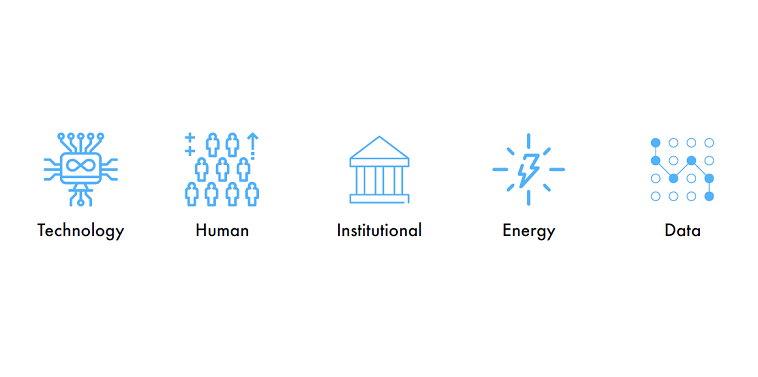There is no shortage of challenges facing smaller cities and counties that want to be “smart” — or “intelligent” — said Xavier Hughes, ICMA’s chief technology and innovation officer, at the first full day of the 104th ICMA Annual Conference in Baltimore, Md. Hughes is a veteran of the Obama administration, as chief innovation office at the Department of Labor, and also a successful entrepreneur.
Smaller cities and counties face the challenges of limited resources, fast-moving technology, a confusing vendor ecosystem, obstacles from either the state or federal level and competition from the biggest cities, including New York, which are leaping ahead of the pack in smart technologies, data collection and data analysis.
That said, Hughes argued, there is hope for smaller cities and counties. Lacking advanced technologies and infrastructure often means there is less legacy infrastructure to replace, he noted. The biggest cities face a higher level of public pressure and are bombarded by vendor pitches. Smaller municipalities, Hughes argued, have greater latitude in their decision-making even if they have less money and fewer resources.
And, at multiple points in his presentation, Hughes emphasized the importance of local government officials in the work they do and the services they provide. He shared personal stories of how local government helped him. These remarks echoed what he said last month in an interview with EfficientGov:
“You are the heartbeat of America. Without your leadership and guidance, we are a rudderless ship. Never forget that. As such, it is our responsibility to empower, advise and support you however necessary, so the right decisions are made, in the most cost efficient manner, while delivering the highest value the market can offer for our communities. And ICMA will accompany you every step of the way.”
What is a smart city?
Hughes prefaced his conference remarks with a few clear markers. One, there is no universal definition of what a smart or intelligent city is (and the terms themselves are interchangeable). Two, many local governments are not even ready to think about becoming a smart or intelligent city. Three, investors are pouring money into the space ($76 billion invested in urban technology over three years), so it’s time to start thinking about what your government will be doing.
While there isn’t a universal definition, Hughes still offered some basic guidelines. Intelligent cities look to foster “open innovation, e-participation, and co-design to improve their collective intelligence”; they seek to improve “economic, social, and cultural development” through their efforts; and they don’t stand pat, as conditions are always changing.
Prerequisites to becoming a smart city
Hughes warned the audience that many local governments aren’t ready to adopt the technologies, much less have a larger-scale plan for how that tech will generate data and transform services and life. Here are just a few things that need to be in place:.
- Do you have a maturity model that signals your current state, the plan forward and things like procurement processes? One example shared in June’s issue of Public Management magazine was the the strategic document and readiness assessment created by Bellevue, Wash.
- Does your government understand the terminology? Does it understand what is necessary to install, much less support, “smart” whatever?
- Does your government have the right talent and training? Is the culture ready?
What does a smart city look like? Hughes emphasized that there are many examples of smart technology, but it’s how they’re used that matters, too.
Smart parking meters, he argued, might be useful in making a city more intelligent if that data is used to alleviate traffic congestion. But if they’re just replacing old parking meters, they’re nice technology but not necessarily “smart.”
Some examples he gave of a smart city in action:
- Robots collecting and reporting on data from public wastewater on a zip-code basis as part of efforts against the opioid crisis.
- Mobility – -for example, using ride-sharing services in conjunction with emergency and medical services to ensure rides are available for the sick, elderly or disabled.
- As some cities have already installed, sensors to listen for gunshots and mobilize an emergency response. In some cases, those sensors are augmented by drones that can monitor the area and provide additional detail before first responders engage.
Hughes went over basic principles and mindsets of an intelligent-city approach, such as the need to reflect, research, design, build and evolve — in that order. More specifically, he discussed the principles of open innovation, the importance of APIs and the need for human-centered design. All three are good practices because of the results they bring, but he also noted how the costs, especially with open innovation and APIs, can fit comfortably within a smaller municipal budget.
Even with the right preparation, lines of responsibility, talent and understanding of the scope of the intelligent-city maturity model, there remain challenges for smaller local governments. For instance, Hughes said, vendors can be difficult to navigate, particularly if the vendors a municipality is dealing with aren’t the same as those serving the state or federal levels.
Privacy will be a concern, too, although Hughes emphasized that smart technologies needn’t sacrifice privacy to deliver the returns cities and counties are looking for.
Finally, Hughes previewed an ICMA inititative coming next year that will help local governments meet these challenges. ICMA will be releasing an offering called DataSphere, which will provide data that can help local governments with such areas as climate, urban development, transit and logistics.
James daSilva is the longtime editor of SmartBrief’s leadership newsletter and blog content, as well as newsletters for distributors, manufacturers and other professions. Before SmartBrief, he was a copy desk chief at a small daily New York newspaper. Sign up for ICMA SmartBrief.
